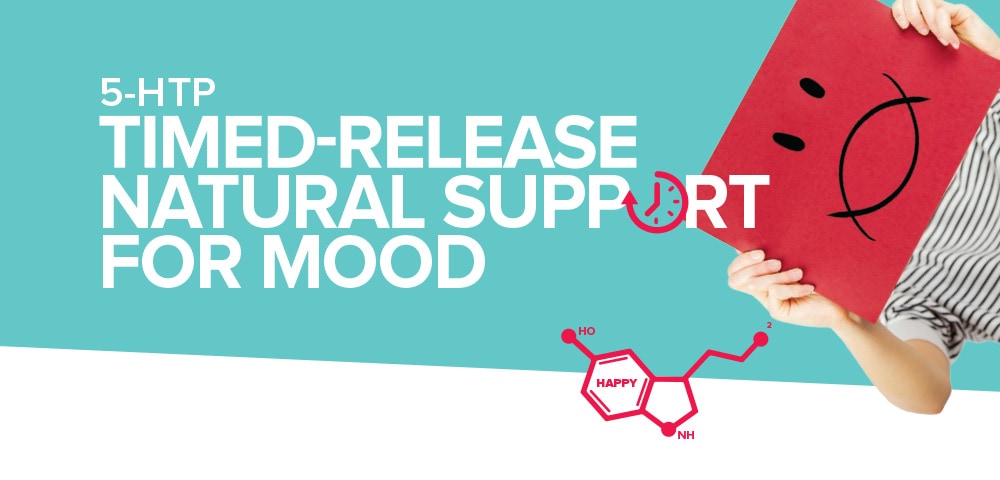
There are many contributing factors to mental health:
diet/lifestyle, hormone imbalance, vitamin/mineral deficiencies, digestive disorders, chronic inflammation, stress, and exposure to environmental toxins.
A randomized double-blind study supplemented seasonal affective disorder (SAD) patients with 150–400 mg of 5-HTP per day. Within the first two weeks, the scores on the Hamilton Rating Scale for Depression (HAM-D) of patients taking the supplement significantly decreased compared with the placebo. After eight weeks, 73% of the patients showed notable improvements in emotional well-being.[1]
5-HTP can also help improve serotonin imbalances associated with chronic pain conditions, such as musculoskeletal pain, tenderness, morning stiffness, and fatigue experienced by fibromyalgia patients.[2] Studies lasting up to one year show that fibromyalgia patients who take 300–400 mg of 5-HTP per day in divided doses can significantly improve the severity of symptoms. [2] By increasing serotonin production, 5-HTP can be used to control appetite and carb cravings. In a placebo-controlled study, overweight women supplemented with 5-HTP for five weeks. Even without having additional dietary restrictions, the women were found to eat less and lose weight during the study.[3]
Healthy serotonin levels help the brain recognize feelings of satiety after eating.
Look for timed-release caplets of 5-HTP, available in natural health stores, because they deliver 5-HTP gradually, helping smooth out the fluctuations in serotonin levels that can often occur with immediate-release forms. This supplementation method is especially crucial for people with weak emotional well-being who cannot risk a relapse of symptoms or adverse events related to rapid spikes in serotonin levels.[4]
Serotonin is one of the major neurotransmitters in the body and plays an essential role in emotional well-being, sleep, pain, and appetite.
Low serotonin can be an underlying factor in multiple chronic health problems.
5-HTP naturally enhances serotonin levels by readily crossing the blood-brain barrier providing a direct route to relieving symptoms of low serotonin.
Common symptoms of low serotonin include:
- Low mood
- Anxiety
- Fibromyalgia
- Migraines
- Sleep disturbances
- Cravings
 DEPRESSION AND ANXIETY DISORDERS are conditions that are becoming more and more prevalent in people of all ages.
DEPRESSION AND ANXIETY DISORDERS are conditions that are becoming more and more prevalent in people of all ages. The numbers are staggering, with mental health disorders affecting about 40 MILLION ADULTS IN NORTH AMERICA in a given year.
The numbers are staggering, with mental health disorders affecting about 40 MILLION ADULTS IN NORTH AMERICA in a given year. The National Institute of Mental Health reports that by 2020, anxiety-related disorders will affect SEVEN OUT OF TEN INDIVIDUALS IN NORTH AMERICA alone.
The National Institute of Mental Health reports that by 2020, anxiety-related disorders will affect SEVEN OUT OF TEN INDIVIDUALS IN NORTH AMERICA alone.
References:
- Jangid P, Malik P, Singh P, et al. Comparative study of efficacy of L-5-hydroxytryptophan and fluoxetine in patients presenting with first depressive episode. Asian Journal of Psychiatry. 2013; 6(1):29-34.
- Birdsall TC. 5-Hydroxytryptophan: A clinically-effective serotonin precursor. Alternative Medicine Review. 1998; 3(4):271-280.
- Ceci F, Cangiano C, Cairella M, et al. The effects of oral 5-hydroxytryptophan administration on feeding behavior in obese adult female subjects. Journal of Neural Transmission. 1989; 76(2):109-117.
- Jacobsen JPR, Oh A, Bangle R, et al. Slow-release delivery enhances the pharmacological properties of oral 5-hydroxytryptophan: mouse proof-of-concept. Neuropsychopharmacology. 2019; 44(12):2082-2090.












